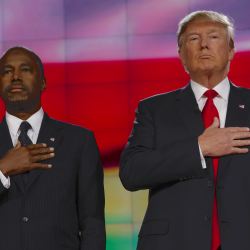This is clearly the week of me being triggered, given I am no fan of the “trigger warning.” Inside-the-box thinking triggers me. Putting arbitrary limitations on human potential triggers me. Labels that attempt to stifle innovation or possibility trigger me.
Dr. Ben Carson, former Republican presidential candidate and pediatric neurosurgeon, was nominated by President-elect Donald Trump to be Secretary of Housing and Urban Development (HUD).
Immediately, a firestorm of political pushback ensued.
The following is part of Democratic Leader Nancy Pelosi’s statement regarding this decision:
“Dr. Ben Carson is a disconcerting and disturbingly unqualified choice to lead a department as complex and consequential as Housing and Urban Development. There is no evidence that Dr. Carson brings the necessary credentials to hold a position with such immense responsibilities and impact on families and communities across America.”
The pundits on television instantaneously erupted. In one CNN panel I caught, they couldn’t stop laughing as the main refrain was he is a neurosurgeon and those skills cannot transfer outside of the operating room and make no sense to head anything other than Health and Human Services (HHS). Another expert on Fox News Channel with Megyn Kelly reiterated the “curious” nature of the choice elaborating on the previous sentiment.
Let’s be clear, I have no issues with civil discourse or freely declaring your opposition to anything— in fact, I promote the concept routinely. I embrace government, public or personal disagreement as exchanging different points of view is essential to continued democracy, personal growth and evolution of thoughts and ideas.
My issue here, regardless of Dr. Ben Carson specifically or whatever particular views he espouses or any political leanings, is the argument that a brain surgeon is unqualified to be anything other than a brain surgeon. A lawyer anything other than a lawyer. A yoga instructor anything other than a yoga instructor. So, to me, the argument that skills can’t be transferrable to other fields or this notion that because an individual has vast experience in one discipline they are forever limited to that domain is empirically flawed.
This is an awful message to give not only children, but adults as well. Life is riddled with challenges, high ups, low downs and can be filled with circumstances that necessitate constant reinvention, resilience and survival. Adaptability and intellectual curiosity and passion are as tied to well-being and happiness as any attributes.
Uncertainty and ambiguity are uncomfortable for most of us, but they stem from fear. Fear can be debilitating often leading to inaction which can be more insidious than decisive action—where course correcting is quite realistic. People at the end of life do not often lament the things they did, but the things they did not do.
An individual acquiring new passions is the sign of a healthy, active mind — whatever path you opt to pursue. Second, third and fourth careers can serve to build from one chapter to the next. Smart people can take on new challenges and shine. And, if they don’t, then lessons are learned and they are replaced. Life goes on and the world does too.
President-elect Trump is no stranger to putting expiration dates on his employees—as evidenced by his shifting campaign chiefs— when tasks were performed and new skills or outlooks were vital to the changing landscape. Is this necessarily bad?
Adapting to change is a very desirable survival skill. Status quo is more comfortable to most of us, no matter how miserable since that tends to be a predictable measure. Unpredictability or uncertainty is really the only true narrative since the control we think we have in this world is a false perception. Visionaries tend to be more at home with ambiguity.
Nontraditional medical students are encouraged these days in medical school. Some enter now having had twenty year alternate careers ranging from farming to journalism. If open to the varied point of view, then these classmates can inspire, inform and expand the discussion. The patient interaction is also altered by the recent college graduate versus the seasoned adult. Is there a right way? Both pathways make people doctors in the end.
What does it take to be a neurosurgeon?
Since it was the first residency I started before switching to pediatrics, I can speak to this. At the time I applied many years ago, the number of residency slots available in the United States was in the 120 range (as memory serves). It seems that number has grown to 216 this year. To give a frame of reference, 7,024 positions were filled this year in internal medicine (an additional 404 for primary care spots —www.nrmp.org).
It is a very competitive residency requiring rigorous academic performance, success, research traditionally drawing students at the top of the class. The residency lasts seven years—that’s after four years of college and four years of medical school— involving often being on-call every other to every third night throughout the duration of the program in addition to your typical work day. That means attending to patients all hours of the night with the majority of them being the sickest patients in the hospital.
Translation: every physical intervention and decision no matter the hour could profoundly adversely impact a human life. A family. A community.
A physician’s population is diverse in all realms— socioeconomic, gender, age, ethnicity, occupation, for example. A complex understanding of physical, emotional, social, environmental, spiritual and mental spheres enables the caregiver to design a comprehensive plan that facilitates success. Engaging multi-disciplinary team members can be necessary. Being the consummate, effective physician requires being an extraordinary multitasker often in a crisis with many moving parts and people.
In Dr. Carson’s case, he became a pediatric neurosurgeon which requires a pediatric fellowship beyond those initial required years. Surgery in this population, in particular, obviates precision, meticulous calculations of fluid balances and shifts, relentless round-the-clock maintenance of pressure in the brain which when uncontrolled can negatively influence multiple organ system function as well as living or dying. Like a cascade. Making delicate maneuvers in precarious and tiny spaces. Grueling in responsibility and stamina required.
Dr. Carson is globally known for being the principal surgeon in a 22-hour operation separating conjoined twins who were attached at the head. This one case alone requires the ability to captain a ship and thrive under the most intense and highly stressful of circumstances. The patient is put in hypothermic and circulatory arrest which have time limits or points of no return. Another such case took 28 hours where the twins were attached at the top of the head instead of the back and the outcome successfully allowed them to remain neurologically intact. These types of cases do not have road maps from a textbook.
Deconstructing Pelosi’s comments…
“Dr. Ben Carson is a disconcerting and disturbingly unqualified choice to lead a department as complex and consequential as Housing and Urban Development.”
He chaired the department at Johns Hopkins which is a top program in the country or world for that matter. That requires managing budgets, personalities, academic achievement, operating, teaching, furthering the field and tremendous politics. In addition, he sits on boards and is the president and founder of a few funds that have humanitarian goals.
Brain tumors, intractable seizures, removing parts of the brain and so on could be some of the most complex and consequential milieus we know — the brain makes us us. Damage to it can be fatal and catastrophic.
Believe it or not, being a brain surgeon qualifies you to do more than brain surgery. Doctors, in general, become expert diagnosticians. That means —in often extreme situations—being able to assess the bottom line and get to the main problem while sifting through incredible volumes of information and data. They have a desire to fix things and make them better.
Poverty imposes tremendous health challenges. Housing is not merely about the walls that surround us. More importantly, it is about those who occupy the space. We should always be employing new and innovative ways to make HUD and all departments better and more effective. The more enhanced, safer and prosperous our communities, the better our world.
I have no dog in the fight over whether Dr. Ben Carson is the right or wrong person for HUD. I welcome hearing all pro and con arguments on that front and fully support such expressions. Just know that saying a brain surgeon cannot possibly do anything other than a direct healthcare job is not one I view as persuasive. Nor, is it one that I think benefits society—especially in the long-term.

